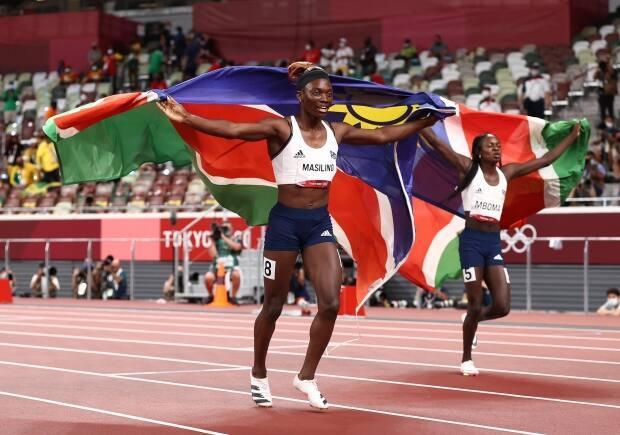If you watched Elaine Thompson-Herah blaze through 200 metres in 21.53 seconds to win her second straight gold medal in that event, you saw a high-stakes race with top-level sprinting, a predictable ending and a surprise finish.
Predictable because Jamaica's Thompson-Herah had already broken the Olympic record over 100 metres, and motored to a 21.66 clocking in her semifinal. And probable because the bronze medal went to Gabby Thomas, the Harvard grad and epidemiologist in training who won the intensely competitive U.S. trials last month. If she stayed healthy and executed, a medal was always probable for her. Only real question was the colour.
The surprise came from silver medallist Christine Mboma, an 18-year-old Namibian sprinter, and a raw rookie at this level of competition, who ran 21.81 to set her third national record of the week. If your pre-race predictions didn't include a teenager chasing down both Thomas and Shelly-Ann Fraser Pryce in a sprint to the podium, that's fine. Anybody who claims to have foreseen it was probably guessing, not predicting.
But anybody who knew Mboma's name could also envision the inevitable, ginned-up controversy.
Earlier this season Mboma and fellow Namibian teen Beatrice Masilingi were world class 400m runners, putting up big numbers in smaller meets. Then World Athletics ordered them to undergo a hormone screening, which revealed a high level of natural testosterone, which in turn disqualified them from running events between 400 metres and a mile, and forced them into the 200 this summer.
Their presence in Tokyo prompted a variety of characters to volunteer opinions on women's physical limits. Retired Polish sprinter Marcin Urbas demanded a gender test for Mboma.
"She has the parametres of an 18-year-old boy. At that age my PB was 22.01 and she has done it in 21.97 in Tokyo," Urbas told the Spanish outlet Marca, apparently unaware of the difference between a teenage phenom and a late bloomer.
And then, of course, came the headlines proclaiming that Mboma and Masilingi caused controversy simply by showing up in Tokyo, as if they had wilfully violated an antidoping rule.
I'll lay it out once more, just so we're clear.
But Mboma and Masilingi have done nothing but exist, excel, and defy expectations. Neither woman is inherently controversial. They're just fast. The scandal is in how some people choose to react to them.
As a policy, I don't engage bad-faith debaters in private or in public, and certainly not on social media. I don't know for sure what circumstantial evidence the "Mboma is Controversial" crowd will lean on to make the case that she's doing something crooked, but I imagine the arguments falling into one of three buckets.
'Olympic final? Silver Medal? They came out of nowhere'
They didn't come out of nowhere. They came from Namibia, north of South Africa and south of Angola. Their national rugby team routinely gets walloped by countries like New Zealand at the World Cup, but at least they qualify. Former junior welterweight boxing champion Julius Indongo is from Namibia, as is Frankie Fredricks, who finished second in Donovan Bailey's historic 100m run in 1996.
The country is also home to sports fans who track Mboma and Masilingi like Canadians do hockey. Within two hours of my first tweet this week mentioning Mboma, I gained three dozen Twitter followers from Namibia. This is a big story over there.
'No 18-year-old can run that fast'
It's the argument you make if you haven't been watching track and field this week. Two 19-year-olds, American Athing Mu and Great Britain's Keely Hodgkinson, topped the podium in the women's 800, and the men's 200 final will feature two more teenagers — 19-year-old Joseph Fanbulleh and 17-year-old Erriyon Knighton. Sydney McLaughlin, the favourite in the women's 400m hurdles, competed in her first Olympics at 17, and so did Allyson Felix, still running this week at age 35.
Between the searing heat and the tight schedule, this week's meet has been especially taxing on the athletes, but nobody's body rebounds like a teenager's, so we can't act surprised when young runners put up breakout performances.
'But we've never even heard of them'
Of course not. They live in Namibia. If Mboma and Masilingi had grown up in North America, we could track them at scholastic meets and imagine how they would stack up against pros. That's what happened with Knighton, who signed with Adidas at 16, and started running against adults this summer.
Or we'd watch them obliterate high schoolers, then beat up on collegians, and then turn pro. That's Mu, who shattered records at her Trenton, N.J., high school, broke some more as a freshman at Texas A&M, and signed with Nike before U.S. Trials.
If Mboma and Masilingi had grown up in North America, we wouldn't have this much controversy. We'd just call them prodigies.
Except we won't let it be that simple with Mboma and Masilingi. So during an Olympics where we've seen Simone Biles highlight the importance of protecting mental health, we also see 18-year-olds dealing with a mainstream press questioning what they've accomplished, and fending off attacks from a middle-aged ex-runner who insists on viewing them through the prism of his own limitations.
A biracial Italian named Lamont Jacobs chopping .15 off his personal best to win the men's 100 metres?
Rai Benjamin running a mind-bending 46.17 in the 400 hurdles — for silver because Karsten Warholm ran 45.94?
Sifan Hassan falling during her 1500m heat Monday, then jumping up to win that heat, and then returning at night to win the 5000?
All all unexpected, but it all happened.
We can't hold Mboma hostage to what we don't think an 18-year-old can achieve. She has a new national record, an Olympic silver medal, and the oversized Namibian flag officials supplied for her post-race celebration.
And she has to deal with a fabricated controversy because she was born outside a reactionary rule that doesn't deserve the credibility the mainstream press lends it.
Source: https://www.cbc.ca

